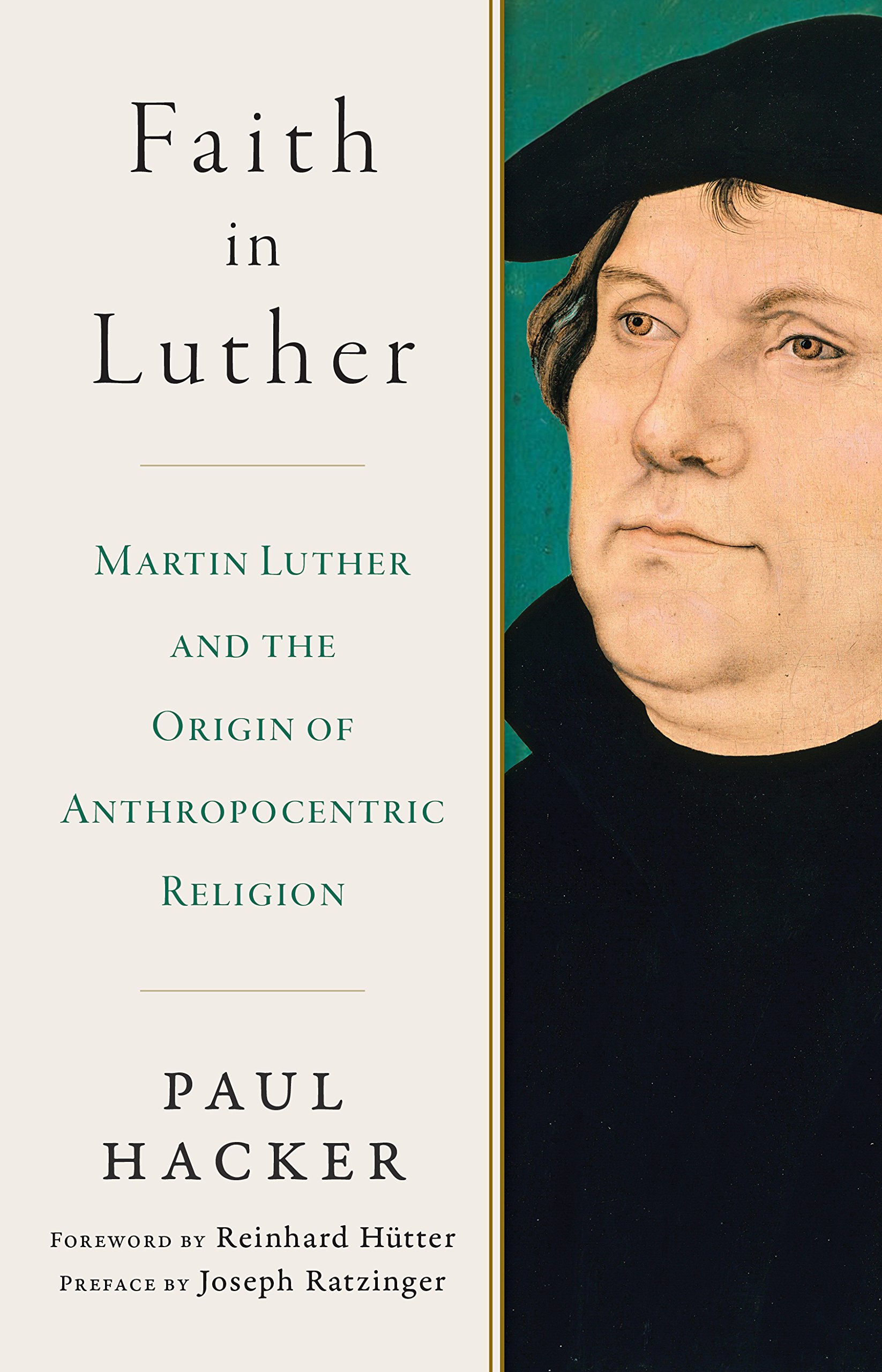“Hacker’s reading of Luther on faith is commendably uninfected by postmodern perspectivalism and the consequent skepticism about the attainability of any truth at all—whether theological, philosophical, or moral. His reading is also completely free from the subtle self-censoring encountered not infrequently in those circles that regard ecumenism not as a form of theology but rather as a form of ecclesial diplomacy. In refreshing contrast to the intellectually stifling etiquette of such ecumenical diplomacy, Hacker’s analysis and interrogation of Luther’s thought is motivated by an uncompromising quest for truth, a trait that makes the book refreshingly untimely—simultaneously old-fashioned and avant-garde.
Hacker’s study is penetrating, far-reaching, and unsparing, yet at the same time utterly objective (sachlich). The outcome is not a foreordained conclusion but rather the result of an extraordinary scholar’s penetrating analysis of Luther’s concept of faith. Luther did not embark on his teaching vocation in 1512 as a professor of Holy Scripture at the University of Wittenberg with this understanding of faith.7 Rather, his new concept of reflexive faith comes to form the very heart of what has later been called Luther’s “Reformation break through.” Hacker offers a precise description: “Luther . . . denotes the faith taught by him as ‘apprehensive faith’ in the sense of ‘seizing faith’ (fides apprehensiva). This means that the faith grasps not only the message of salvation but salvation itself or even Christ himself.”8 Why would Hacker designate this understanding of faith as “reflexive faith”? In order to account for his choice of terms, Hacker adduces a characteristic passage from a sermon Luther preached in Leipzig on June 29, 1519, the feast of Saints Peter and Paul: “If a man doubts and is not firmly convinced that he has a merciful God, he does not have him. As he believes, so he has. Therefore nobody can possibly know that he is in God’s grace and that God is propitious to him except through faith. If he believes it, he is blessed; if not, he is condemned. For such assurance and good conscience is the right . . . faith that God’s grace works in us.”9 Based on this and many similar passages in Luther’s sprawling oeuvre Hacker concludes: “According to [Luther], what properly justifies is not simply faith in God or Christ. Only the reflection, qualified by certitude, that God’s salvific deed is meant ‘for me’ works salvation, and this reflection brings about its effect infallibly.”10 Because Luther conceives of the apprehensive faith as something—quite paradoxically—essentially passive, as an undergoing, a suffering, it is only when it becomes reflexive that faith secures God’s gift of salvation to the individual believer. The complete “realization” of this “pro me,” this “for me” of the Gospel’s promissio (Verheissungswort) comes about by way of a “bending back” of the consciousness to the believing self. Without this reflexivity, justifying faith would be indistinguishable from what Luther dismisses as a testimonial belief in the facticity of certain events (fides historica). It is the very reflexive move that, according to Luther, applies the gospel promise effectively to the believer and thereby makes the faith justificatory, that is, salvific. Significantly and problematically, for Luther, reflexive faith and salvation do indeed coincide. Two theses proposed by Luther in a disputation “On Faith” in 1535 give witness to the consistency of Luther’s thought over the years from 1519 to 1535 and beyond on what is for him the absolutely crucial point about the faith that justifies: “It is that ‘For me’ or ‘For us’ which, if believed, constitutes this true faith and distinguishes it from any other sort of faith which only accepts that certain events did happen” (thesis 24). “This is the faith which alone justifies” (thesis 25).11
-Hacker, Paul (2017-09-22T23:58:59). Faith in Luther: Martin Luther and the Origin of Anthropocentric Religion (Kindle Locations 121-154). Emmaus Academic. Kindle Edition.
Love & truth,
Matthew
8 Faith in Luther (Emmaus Academic, 2017), 10.
9 WA 2, p. 249, lines 5–11. (Hacker’s translation from the German, p. 10). It should give theologians pause for reflection that the atheist and materialist philosopher Ludwig Feuerbach (1804–1872), author of the influential The Essence of Christianity (1846), draws upon precisely this understanding of faith in Luther’s thought in order to draw the most radical anthropocentric consequences from it, namely to posit that the true essence of religion is exclusively anthropological. Two passages from his little known, but significant work Das Wesen des Glaubens im Sinne Luthers (Darmstadt: Wissenschaftliche Buchgesellschaft, 1984) shall suffice as illustration: “Gott ist ein Wort, dessen Sinn nur der Mensch ist. Das Wesen des Glaubens im Sinne Luthers besteht daher in dem Glauben an Gott als ein sich wesentlich auf den Menschen beziehendes Wesen—in dem Glauben, daß Gott nicht ein für sich selbst oder gar wider uns, sondern vielmehr ein für uns seiendes, gutes und zwar uns Menschen gutes Wesen ist” (p.18). “Hierin haben wir den Sinn von den so oft von Luther ausgesprochenen Gedanken: ‘Wie Du glaubst, so geschieht Dir;’ ‘glaubst Du es, so hast Du es, glaubst Du es nicht, so ist es nicht; ‘glaubst Du z.B., daß Dir Gott gut ist, so ist er Dir
10 Faith in Luther (Emmaus Academic, 2017), 10.
11 “Die Thesen für die Promotionsdisputation von Hieronymus Weller und Nikolaus Medler” on the topic “Arbitramur hominem iustificari fide absque operibus legis.” WA 39 I, p. 46, lines 7–10. (Hacker’s translation from the Latin). The original reads: “24. Igitur illud, pro Me, seu pro Nobis, si creditur, facit istam veram fidem et secernit ab omni alia fide, quae res tantum gestas audit. 25. Haec est fides, quae sola nos iustificat sine lege et operibus per misericordiam Dei, in Christo exhibitam.”
.

